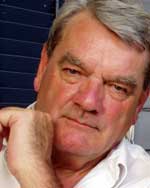An expert comments on The Virus House N. P. Landsman in Studies in History and Philosophy of Modern Physics, vol. 33 (2002), pages 297-325 Getting even with Heisenberg
The entire book is a pleasure to read; the chapters on the sabotage of the Norske Hydro plant have the quality of a thriller. From it, one obtains a reasonably accurate overview of the project from the discovery of nuclear fission up to the internment of the ten scientists at Farm Hall (to his openly stated dismay, Irving was given no access to the Farm Hall transcripts; see Irving, 1967, p. 276). Irving does not fall into the trap of putting Heisenberg at the centre stage; in fact, his unsung hero is Harteck, who, Irving assures, 'given the funds, the men, and the materials, could certainly have produced an atomic bomb for Germany' (Irving, 1967, p. 265). Irving sees the German nuclear scientists' failure to 'fire Speer's imagination with the possibilities of nuclear fission' (Irving, 1967, p. 267) as their greatest shortcoming. The slow pace of the project is blamed, firstly, on the fact that the project was directed by scientists (and not by the military, as in America): 'In short, the behaviour of the German scientific leaders demonstrated that during war, science cannot be safely left to scientists.' (Irving, 1967, p. 270); and, secondly, on the emphasis on theory, the latter point with direct reference to Heisenberg. Interestingly, we have Heisenberg's reaction to Irving's book. In an interview with Ermenc (1989), he says that 'Irving's book is a very good book in the sense that it gives all the facts or practically all the facts. But it has one deficiency. When he tries to determine motives he does not do very well because he cannot think himself into the atmosphere of a totalitarian country making war.' In some respects, Irving indeed follows Heisenberg's version of events, such as in his emphasis of Bothe's graphite measurement, the subsequent decision to continue with heavy water as a moderator, and also in his acceptance of Heisenberg's claims, contra Goudsmit, that he had fully understood the principles of the atomic bomb. Rose (pp. 53-54) provides a detailed list of factual errors in The Virus House, but his portrayal of Irving as Heisenberg's man puts little weight on Irving's discarding any suggestion by the Germans to the effect that they did not make the bomb because they did not want it. In fact, he writes that 'there is no indication that at any stage in the logical process of development the scientists' scruples would have become powerful enough to overcome their natural curiosity to see what came next.' (Irving, 1967, p. 268). Indeed, what makes Irving (1967) particularly realistic
is the absence of a moral dimension, both in the author and
in his subjects. [More reviews of The Virus House]
For the full text, from which the above is extracted, see Landsman's review article (pdf) of Professor Laurence Rose's book: Rose published Heisenberg and the Nazi Atomic Bomb Project: A Study in German Culture (University of California Press, 1998). An Israeli academic and Mitrani Professor of Jewish Studies and European History, as well as directing the Center for Research on Antisemitism at Pennsylvania State University, Rose also wrote lesser studies. I gave him unlimited access to my interview transcripts and working files, and in a subsequent essay he referred ungraciously to my "Holocaust denial" and "self-evidently ridiculous assertions," neither of which did he however specify.
|
 "THE
"THE
 David
Irving comments:
David
Irving comments: